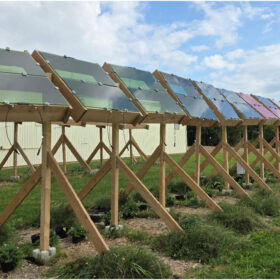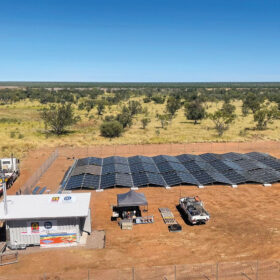History of U.S. tariffs and how they relate to solar
Days after entering office, the Trump administration announced tariffs on key US trading partners. While Canada and Mexico negotiated a one-month stay, it appears tariffs are set to play an even larger role in US trade policy through 2029. Paula Mints examines the history of U.S. tariffs with a focus on the solar industry.
Canadian government invests in heat pump subsidies for Manitoba
The Canadian government has announced further investment in the country’s heat pump subsidy scheme, which offers homeowners an up to CAD 20,000 ($21,695) payment towards heat pump installations, aimed at the province of Manitoba.
Cadmium telluride vs. crystalline silicon in agrivoltaics
Researchers in Canada have compared strawberry growth under uniform illumination from semi-transparent thin-film cadmium telluride panels and non-uniform illumination from semi-transparent crystalline silicon modules. Their analysis considered metrics such as fresh weight, height, leaf count, chlorophyll content, soil temperature and humidity.
Weak La Niña patterns shape North American solar in February
In a new weekly update for pv magazine, Solcast, a DNV company, reports a mixed picture for solar irradiance across North America, influenced by the weak La Niña pattern that first emerged in the tropical Pacific last year.
Canada deploys 314 MW of solar in 2024
Canada installed 314 MW of solar in 2024, bringing its cumulative installed PV capacity to more than 5 GW, says the Canadian Renewable Energy Association.
Sinovoltaics updates map of North American solar supply chain
The North American manufacturing hub has added several new producers across the PV module supply chain but analysts see continued cell, wafer, and polysilicon capacity constraints. The report is based on announcements of capacities at sites in the region producing PV modules, cells, wafers, ingots, polysilicon, and metallurgical-grade silicon.
New algorithm for fault detection in renewables microgrids
An Iraqi-Canadian research team has created a new algorithm that can detect direction change in the line current of renewables-based microgrids. The novel approach can be applied to both grid-forming and grid-following infrastructures.
Canadian startup unveils substring inverter prototypes
Daanaa says its news Zodiac substring inverter delivers up to 42% more energy than a regular setup.
Strawberry fields forever, and with transparent PV
Scientists have grown strawberries under thin-film cadmium telluride panels with varying transparency. They found that 40% transparency maintained a greater than 80% yield of uncovered plants. If all strawberry farms in the world were converted to agrivoltaics, they would produce up to 173 TWh a year.
Mitrex launches solar PV railing systems
The Canadian building-integrated PV manufacturer has launched semi-transparent and opaque solar PV railing systems for balconies or walkways, for retrofit or new buildings. The products are delivered with support bars, concealed cabling and a choice of mounting systems.










